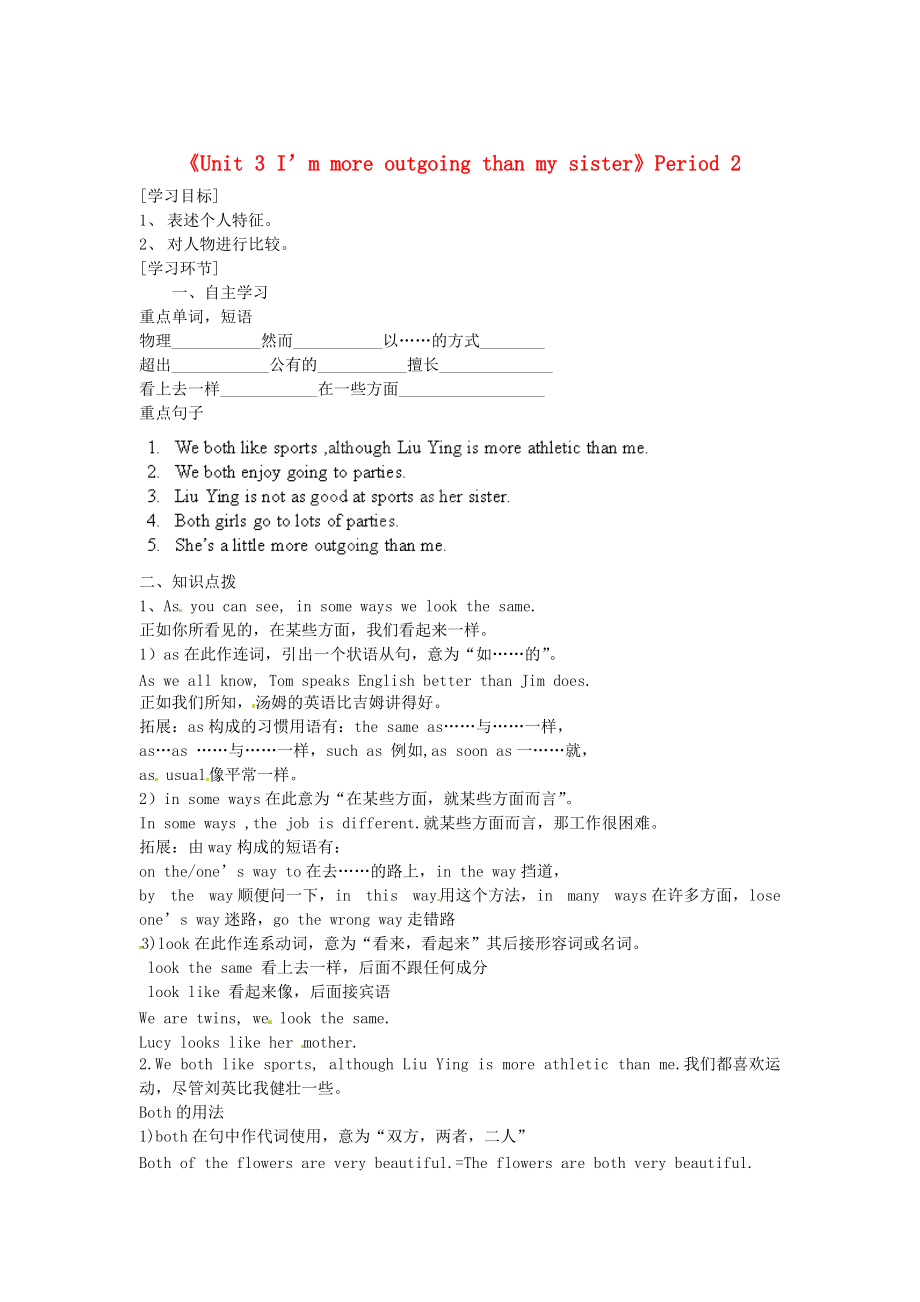《人教版八年級(jí)英語上冊(cè)Unit 3 Period 2導(dǎo)學(xué)案》由會(huì)員分享�,可在線閱讀,更多相關(guān)《人教版八年級(jí)英語上冊(cè)Unit 3 Period 2導(dǎo)學(xué)案(3頁珍藏版)》請(qǐng)?jiān)谘b配圖網(wǎng)上搜索�。
1、 精品資料
《Unit 3 I’m more outgoing than my sister》Period 2
[學(xué)習(xí)目標(biāo)]
1�����、 表述個(gè)人特征�。
2、 對(duì)人物進(jìn)行比較�。
[學(xué)習(xí)環(huán)節(jié)]
一、 自主學(xué)習(xí)
重點(diǎn)單詞��,短語
物理___________然而___________以……的方式________
超出____________公有的___________擅長(zhǎng)______________
看上去一樣____________在一些方面__________________
重點(diǎn)句子
二�����、知識(shí)點(diǎn)撥
1、As you c
2����、an see, in some ways we look the same.
正如你所看見的,在某些方面�����,我們看起來一樣��。
1)as在此作連詞����,引出一個(gè)狀語從句,意為“如……的”�。
As we all know, Tom speaks English better than Jim does.
正如我們所知,湯姆的英語比吉姆講得好�����。
拓展:as構(gòu)成的習(xí)慣用語有:the same as……與……一樣�����,
as…as ……與……一樣,such as 例如,as soon as一……就�,
as usual像平常一樣。
2)in some ways在此意為“在某些方面���,就某些方面而言”����。
3�、
In some ways ,the job is different.就某些方面而言��,那工作很困難�����。
拓展:由way構(gòu)成的短語有:
on the/one’s way to在去……的路上�����,in the way擋道���,
by the way順便問一下�����,in this way用這個(gè)方法����,in many ways在許多方面,lose one’s way迷路��,go the wrong way走錯(cuò)路
3)look在此作連系動(dòng)詞�����,意為“看來����,看起來”其后接形容詞或名詞。
look the same 看上去一樣�,后面不跟任何成分
look like 看起來像,后面接賓語
We are tw
4����、ins, we look the same.
Lucy looks like her mother.
2.We both like sports, although Liu Ying is more athletic than me.我們都喜歡運(yùn)動(dòng),盡管劉英比我健壯一些��。
Both的用法
1)both在句中作代詞使用���,意為“雙方�����,兩者���,二人”
Both of the flowers are very beautiful.=The flowers are both very beautiful.
那兩朵花都很漂亮����。
Both of them are interested in En
5��、glish.=They are both interested in English.
他們兩個(gè)都對(duì)英語感興趣�����。
2)both還可以用作形容詞�,意為“兩者的�����,雙方的”�。
Both the answers are right.兩個(gè)答案都對(duì)。
3)構(gòu)成both…and…意為“不僅……而且……”�,可連接兩個(gè)并列的成分,若連接兩個(gè)并列的主語�,謂語動(dòng)詞用復(fù)數(shù)形式�����。
Both you and I were wrong你和我都錯(cuò)了����。
He can speak both English and French.他會(huì)說英語和法語�。
注意:both…and …的否定式為neither…nor…或not
6、…either…or…
He can speak neither English nor French.=He can’t speak either English or French..他既不會(huì)講英語也不會(huì)講法語����。
拓展:both的反義詞是neither意為兩者都不。
Neither of them is outgoing.他們兩個(gè)都不外向��。 (謂語動(dòng)詞用單數(shù)形式��。)
4) both與all
A����、都含有 “ 都“的意思,兩者均可用作限定詞和代詞�,可與連用。
B���、both表示兩者都……����,反義詞是neither
His parents both like going walks a
7、fter dinner.他父母都喜歡在晚飯后散步���。
all表示“三者或三者以上都”反義詞是none����。
They all want to visit the zoo.他們都想去動(dòng)物園����。
C、both和all用于句中�����,一般放在情態(tài)動(dòng)詞�,助動(dòng)詞或系動(dòng)詞be之后���,實(shí)義動(dòng)詞之前��。
We are both/all very tired.我們都很累����。
3、 She’s a little more outgoing than me.她比我外向一點(diǎn)�����。
1)a little在此修飾比較級(jí)more outgoing表示程度�。在形容詞比較級(jí)的前面,可以用一些副詞修飾�,加以強(qiáng)調(diào),表示更……�,……得多,這些副
8����、詞還包括much, even, far, still, a lot等。
Jim is much taller than Tom吉姆比湯姆高多了��。
2)very ,too, quite, so等詞也是程度副詞����,可修飾形容詞或副詞不達(dá)意,但只能修飾原級(jí)�����。
The bag is very beautiful. The coat is too small.
4.Liu Li has more than one sister.劉麗不止一個(gè)姐妹�����。
more than one+單數(shù)名詞,意為“不止一個(gè)……”����,若作主語,盡管從意義上看是復(fù)數(shù)�����,但謂語動(dòng)詞仍用單數(shù)形式�。
more than one
9、 book is on the desk.書桌上不止有一本書�。
三、隨堂練習(xí)�����。
用適當(dāng)?shù)慕樵~填空
1. I’m better_____ math than Li Lei.
2. I’d like to go _____you. However, I’m busy.
3. The color of his clothes looks the same ________yours.
4. ________some ways they have the same interests.
5. This problem is different_______ that one.
用所給詞的適當(dāng)形式填空�。
 人教版八年級(jí)英語上冊(cè)Unit 3 Period 2導(dǎo)學(xué)案
人教版八年級(jí)英語上冊(cè)Unit 3 Period 2導(dǎo)學(xué)案

